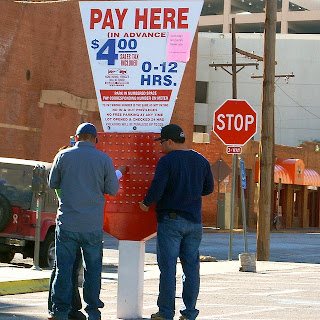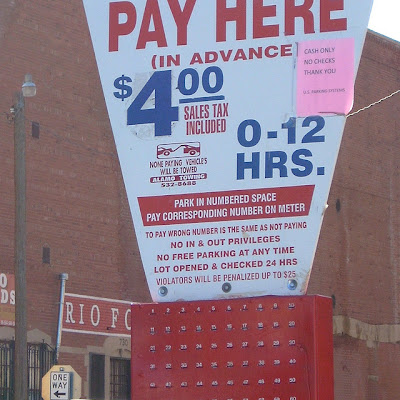This is a revised version of this previous post.
Parking lot
discipline
 |
| Discipline and Punish and the U.S. Parking pay box (Source: crdrapes, Flickr.com) |
Texas license-plated
cars displaying expired state inspection stickers will receive a ticket from
police officers. Such law enforcement officials stake out places where they believe they can readily see,
detain, and punish. They do this by issuing a ticket for infractions of the law. As a result,
the driver goes to court to prove their car can display a valid sticker.
However, the court does not see the car, but only a receipt for the sticker;
this method of substitution shows that the car passed the state inspection; it is in
a state of being mechanically and environmentally safe.
If the vehicle owner
needs to reschedule their court date, a form obtained from an attorney,
will defer the court appearance and allow the driver to receive another court date. In
order to reschedule, however, the driver must go first, with form in hand, to
the Municipal Courts building on Overland Street. There, they pay the clerk 10¢ for a
stamped-dated copy (she’ll give you a receipt for the money), and will file your request to reschedule accordingly.
After first arriving in front of the
building, however, a driver must park their car. A lack of free or
metered parking on the street in front of the building results from the many
reserved spaces marked for police and consulate cars (note that the Mexican
Consulate is around the corner on the not so ironically named San Antonio
Street.) Therefore, if a member of the public has business to conduct in the
courts building, a driver must park their car inside the U.S. Parking lot
across the street. It was inside this
space that I first noticed the punitive connection between said ticketed
vehicles, the vehicle owners, the government, the enclosed parking lot space,
the company owning the lot, and the transparent outcome as defined by Foucault.
In Discipline and Punish, Michel Foucault argued that spaces, particularly those created by the state, use various rhetorical
devices such as work orders, building codes, permits, inspections, and even parking
tickets. Together, they form areas of “enclosure” common to all, which Foucault explained is “a “protected place of disciplinary monotony” (pg. 141). Such monotony encloses
places that will transparently discipline and punish, which serve to control public behavior. While such spaces change and shift over time
and location, those controlled include all who utilize the
parking lot, whether vehicle owner, attorney, or consulate worker.
While a
community designs their towns by applying codes, permits, and laws, over time,
such collections of rhetorical formations, whether paper, asphalt, paint, or
brick create enclosures. Generally, the public never sees or feels enclosure because such accumulated visual statements present a normal, familiar, and therefore, neutrally
silent space. Over time, layers within larger spaces, such as buildings,
streets, and sidewalks are torn down, and reconstructed as required for safety
and redevelopment. This results in widened street lanes, sidewalks disappearing
or appearing with new ramps installed for those with special needs (ADA compliance), or even
side streets disappearing altogether to enlarge nearby buildings (such as seen
in developments recently built by First Baptist Church on Montana Street). By
decree, many street level details will change (and those systems residing underground,
too, such as drainage pipes and cable lines). Each change results in outcomes
never planned originally. In this somewhat painless yet effective (re)formation,
changes have the potential to punish and discipline due to the order and powers
ordering the changes. On the other hand, pre-determined and publicly approved
designs and spaces such as prisons and schools control behaviors overtly. In terms of the San Antonio Street parking
lot, I located an enclosed space that shocked and enlightened when I briefly applied
Foucault’s notion of distributing individuals where I, and others stood.
Street side
 |
U. S. Parking pay box detail (Source: crdrapes, Flicker.com)
|
U.S. Parking constructs simple
facilities, and at this location present a simple asphalt-covered ground with
yellow or white diagonal painted lines and numbers that denote spaces to rent
for short-term vehicle parking. A simple metal box pained red, soldered to a
pole stands at the parking lot entrance. Atop the box a flat trapezoidal-shaped
metal sign explains the terms for parking, the cost, who to call in case the
vehicle violates the terms and gets towed, and the length of time for which you
paid (four dollars). Painted in patriotic red, white, and blue upon a white field,
the first line in the largest, upper case text shouts, “PAY HERE / (IN
ADVANCE).” Blue text explains the fee and hours, and a red band with white text
instructs the driver to “park in numbered space / pay corresponding number on
meter (the box). The box accepts coins and bills; according to a pink paper
taped to the sign, you may not pay with a check. At this location, U. S.
Parking exchanges money for the privilege of parking from 0—12 hours. On a slow
day, this means I paid for about 15 minutes of space rental time.
Based on the
configuration of a space within a space, the parking lot conforms to Foucault’s
definition of partitioning, a
“disciplinary space tends to be divided into as many sections as there are
bodies or elements to be distributed” (pg. 143). Within partitioning lies the
discipline, although Foucault further explains that such spaces are
free-floating and having no order; this means that the spaces and the lot are
both elements of the same larger space. For Foucault, the more important idea
here is to know that it is the hierarchy that determines the power exerted over
the vehicles, drivers, and spaces, while the city (and the parking lot company)
ranks higher than the renters, walkers, and workers. However, the parking lot ritual
becomes further Byzantine due to the method by which renters pay their fee. It
is not merely the amount you must pay, but how you pay the rent.
To pay for a parking
space, a driver puts money into the box by cramming the bills into the
corresponding slot, which is a narrow slit in the red metal box attached to a
pole. This is further complicated by a small pink piece of paper taped to the
sign that reads, “cash, no checks please.” Therefore, it is not just the price
of the parking lot space ($4 for 15 minutes in my case), because this is
America. Instead, it was the way a person must “feed,” stuff, or cram the money
into the red box.
While the rent
is four dollars, I believe the company hopes you will pay the rent using a $5
bill because you were late, rushed, or did not have the exact change. The box
has extremely narrow slots, which works together, along with the location of
the lot and its spaces. The manner of how to pay the money and why you must pay
illustrates how the location can punish and discipline a second time. The box disciplines by
making you cram the money into the red box, which you would not have had to do
if you had had your car inspected on time, if you had taken the bus and walked
to the building, if you had someone drop you off, or if you had taken a cab. The
slot punishes because you must stand and roll your dollar bills so tight. For
me, the action of rolling made me think about my grandfather who rolled his own
cigarettes with Bugler Tobacco. It punished me because it made me remember that
I still miss him even though he died many years ago. It punishes because I must
stand in line with others, who will watch my money rolling procedure. It punishes
others because I watched them, as well—in fact, I took their picture for this essay.
Further, before I left the lot I had to make sure the money dropped to the
bottom of the box. So I had to cram the bills into the box with a metal shiv attached by a chain to the red U.S. Parking box. This then reminded me of all those
television police procedurals with detectives inspecting dead bodies of
prisoners killed with prison-made shivs.
Geography
disciplines and punishes through place, the parking spaces, the other renters,
the corporation, and the box that stands across from the courts that represent
the state—the place where no one can park on the street. In the end, the
hierarchy of space, place, and occasion add up to what Foucault describes as
“the space of … perpetual movement in which individuals replace one another in
a space marked off by aligned intervals” (147). In the end, our “docile bodies”
engage with the cycle, which began with a specific time and place because of my
expired inspection sticker, and the police officer that issued the ticket, which
later resulted in my having to reschedule my court appearance (for which I did
attend). The sticker, the ticket, the court date, the dollar bills, the sign,
the narrow slots, the metal shive, the street, the courts, and the red box all align
to discipline and punish those wanting the privilege of driving and relocating
bodies within spaces created by and for a hierarchy of power.
Reference: Foucault,
M. (1995). Docile bodies. In A. Sheridan (Trans.), Discipline and punish: The
birth of the prison (2nd ed., pp. 135-169). New York, NY: Vintage. (Original
work published 1975)
This essay was originally
published by Drapes, C. R. (2009, December 19). Discipline and punish and the US
Parking slotted pay box [Web log post]. Retrieved from el paso daily photo
blog: http://www.chacal.us/2009/12/discipline-and-punish-and-us-parking.html
